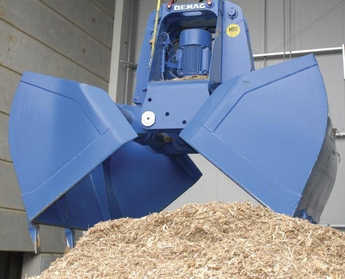British power plant purchases grab bridge crane
The workflow of the combined cooling, heating and power power plant is based on the comprehensive utilization of energy, aiming to achieve cascade utilization of energy and improve energy utilization efficiency. Today Dongqi Crane shares a case of purchasing a grab bridge crane for a British combined cooling, heating and power plant. In this case, the customer uses the bridge crane to transport wood chips that power a biomass boiler.
Grab bridge crane comes into play at power plant
The 23,000sq m development in Osterley, west London, will be powered by a combined cooling, heat and power (CCHP) power plant capable of producing 1MW of electricity and 5MW of heat.
The plant requires 10,000 tonnes of wood chips from crushed pallets to generate the energy, which are stored in a sunken “input” area after being transported to the site.
When sensors in the material flow management system indicate low biomass levels in the furnace, a 6.3-ton grab bridge crane lifts the biomass from the storage area into the silo. The silo then feeds the furnace when biomass is needed via a conveyor system that is activated once the biomass level drops below a predetermined level.
The crane has a span of 7.8m, long reach and cross travel speeds of 1.5–40m/min and 1.5–20m/min respectively, and uses a 4.5m3 capacity clamshell grab fitted with tines and side cutters to lift biomass.
To achieve this without the risk of damaging the walls of the storage facility, the crane supplier fitted the crane with an inverter-controlled drive to enable precise positioning and minimize load sway.
Limiters on the crane’s lateral speed and travel speed also help achieve this, along with anti-derailment protection for the crab trolley and heavy-duty rope guides mounted on the rope hoist to counteract side pull forces.
The wire rope hoist is capable of lifting speeds between 1m/min and 16m/min and comes with fail-safe bottom block operated lifting limits.
All motors on the crane system supplied by the crane supplier are housed in IP55-rated enclosures to prevent dust ingress in the storage area, and the crane also features electronic overload protection, slack rope detection and radio remote control.

What working conditions are suitable for grab bridge cranes
Due to its special design and functions, grab bridge crane is particularly suitable for some specific working conditions and occasions. The following are the types of conditions applicable to grab overhead cranes:
- Bulk material handling: The grab device of the grab bridge crane makes it very suitable for loading and unloading bulk materials, such as coal, ore, sand, etc. In power plants, freight yards, workshops, docks and other places, this kind of crane can efficiently load, unload and transport bulk materials.
- Material storage and unloading: In raw material preparation operations, grab bridge cranes can perform tasks such as unloading, stockpiling, unloading, retrieving and loading materials. Its powerful lifting capacity and flexible maneuverability make it ideal for this type of operation.
- Automatic fetching operations: The grab bridge crane is an automatic fetching machine. Its grabbing and unloading of materials is controlled by the operator without the need for auxiliary personnel. Therefore, it is very suitable for operating environments that require automation and efficiency. Use, such as large warehouses or production lines.
In addition, grab bridge cranes are also widely used in factories, warehouses, logistics centers and other places to meet the loading, unloading and handling needs of various goods. For example, it can be used to load and unload heavy items such as steel, cement, and wood.
